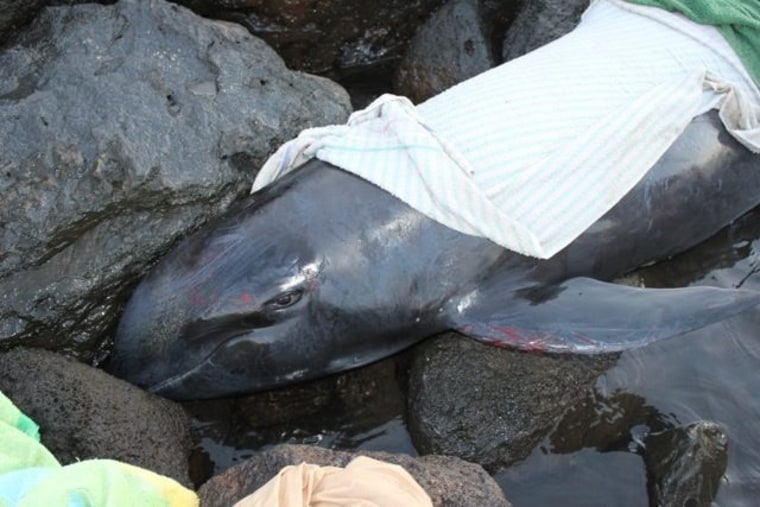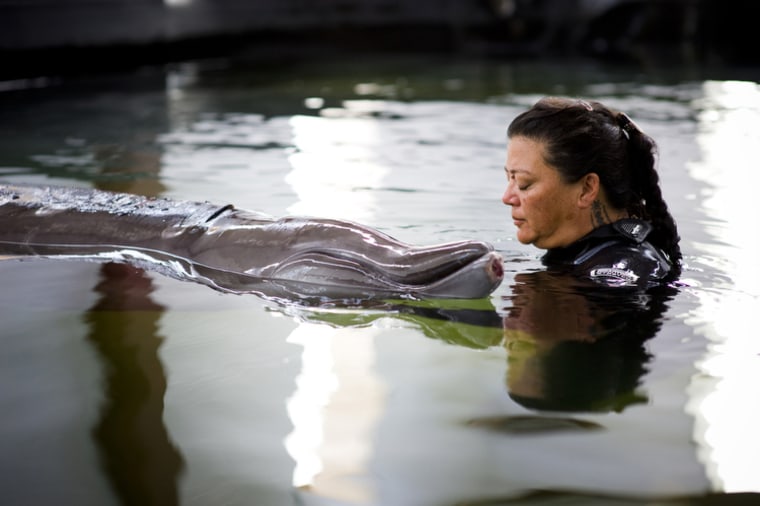Two Native Hawaiian cultural practitioners and an organization dedicated to protecting marine animals are facing federal charges from the National Oceanic and Atmospheric Administration (NOAA) and a possible $27,000 fine for allegedly violating the Marine Mammal Protection Act (MMPA). Kealoha Pisciotta, Roxanne Stewart, and Kai Palaoa LLC said that they simply conducted a traditional Hawaiian sea burial of a melon-headed whale (Peponocephala electra, a member of the dolphin family) that died after the NOAA left the scene without giving them further instructions in June 2014 at Kawaihae, on the big island of Hawaii.
"We answered the call from the community to care for Wānanalua [the melon-headed whale]; it was not only our responsibility but it was our supreme honor and privilege to do so,” Stewart told NBC News. “It is our hope that in telling our story we can move more collectively for an integrated model of care for Kanaloa [marine mammals and other ocean animals], perhaps a start of a great movement forward in affecting much needed and well overdue change within NOAA and how they navigate here in Hawai'i, where being a native Hawaiian cultural practitioner is not illegal."

Under the Marine Mammal Protection Act (MMPA), it is illegal to "take," which means to “harass, hunt, capture, collect, or kill, or attempt to harass, hunt, capture, collect, or kill” any marine mammal without a permit. It is also illegal to transport marine mammals on the high seas.
However, Native Hawaiian cultural practices are also protected by the Hawaiian State Constitution and by federal protections of freedom of religion, advocates say. Whales and marine mammals are considered sacred to Native Hawaiians because they represent deities and the ancestors of the Native Hawaiians.
RELATED: New Hearings Begin on Embattled Proposed Mauna Kea Telescope
Pisciotta and Stewart are members of the Hilo Marine Mammal Response Network (HMMRN), and they have previously worked with NOAA and Hawaii Cetacean Rehabilitation Facility, according to their attorney.
Pisciotta and Stewart assert that the NOAA was there that day but then left before the whale died at 1:00 a.m., without leaving any instructions about what they should do. Without any instruction or NOAA officials, the women conducted a sea burial the next morning by weighting the whale’s body with stones in order to return the whale to the sea in accordance with Native Hawaiian cultural practices.

Pisciotta explains that they are not opposed to science, and although they will not agree to euthanasia of a whale or marine mammal, they have in the past participated in necropsies to understand why whales and marine mammals died, so long as the bones are eventually returned to the sea with the proper prayers and rituals.
"The practitioners’ actions [are] not the type of behavior the [MMPA] had intended to cover,” attorney Gary Zamber, who represents the women, told NBC News. “They provided care and hospice for the whale, keeping her safe from predators. That the governmental officials left the scene in apparent deference to the Native Hawaiian cultural practitioners demonstrates an acquiescence and tacit approval of their behavior. To later attempt to sanction these women who had only ever worked in concert with NOAA to bridge cultural divide would be [an] absurd result.”
David Shofield, NOAA regional marine mammal response program coordinator, told NBC News that the NOAA has worked with many different Hawaiian cultural practitioners and community leaders across all the islands, and there are differing views on many things, including euthanasia and whale burial practices.
“We do our best to work respectfully with different cultures and different communities, but within the parameters of federal law, that is, the Marine Mammal Protection Act and the Endangered Species Act,” Shofield told NBC News.
Shofield further said that because the cultural practitioners had been trained in stranding response, NOAA officials did not mind letting them proceed that day, despite their disagreements over whether the whale should be humanely euthanized. However, NOAA expected that the whale would still be there the next morning, whether it had lived through the night or not, he said.
Because the two cultural practitioners had already transported the whale’s body out to sea without federal authorization, NOAA was unable to verify whether the whale had actually died, as sometimes sick whales go into “dive mode” and hold their breath for as long as an hour, Shofield said. NOAA was also unable to conduct a necropsy which would have contributed valuable scientific information about the whale, where it lived, and why it died.
“We are committed to working with diverse cultures and communities, but we have to do it within the law, so we hope for a mutually respectful relationship of both federal regulation and Hawaiian cultural needs,” said Shofield.
Follow NBC Asian America on Facebook, Twitter, Instagram, and Tumblr.